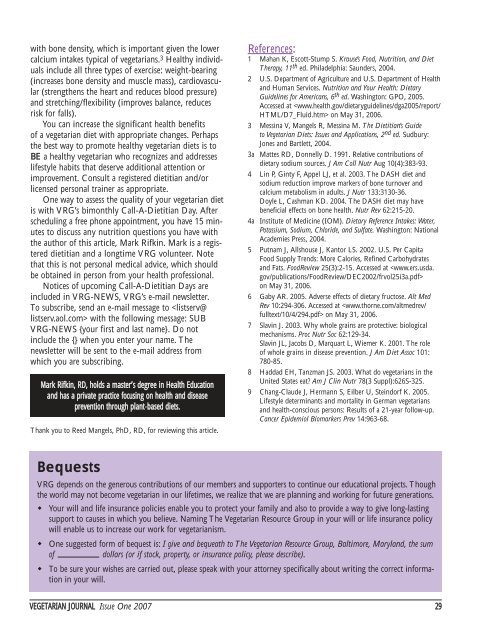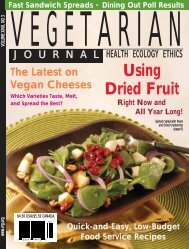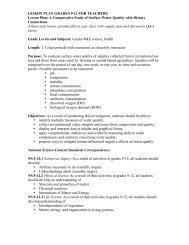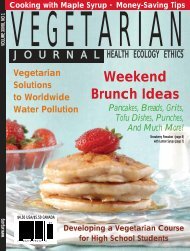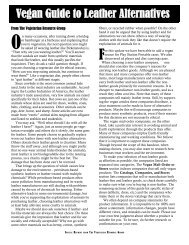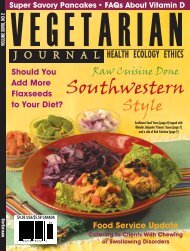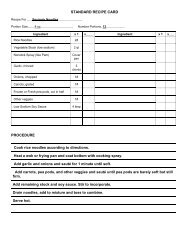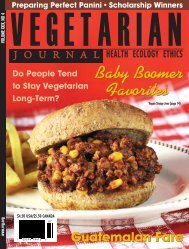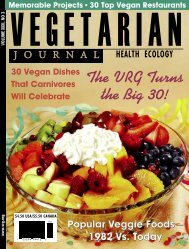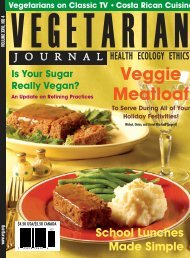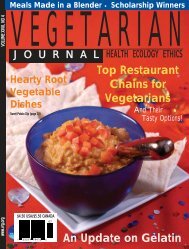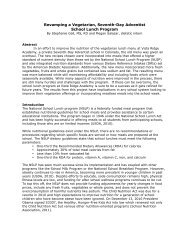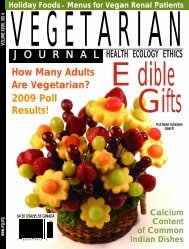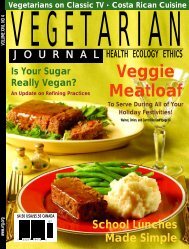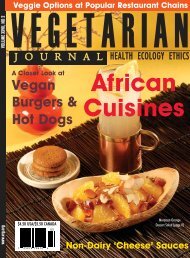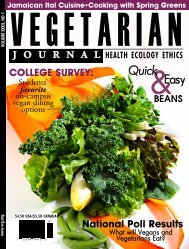Vegan Thickeners - The Vegetarian Resource Group
Vegan Thickeners - The Vegetarian Resource Group
Vegan Thickeners - The Vegetarian Resource Group
Create successful ePaper yourself
Turn your PDF publications into a flip-book with our unique Google optimized e-Paper software.
with bone density, which is important given the lower<br />
calcium intakes typical of vegetarians. 3 Healthy individuals<br />
include all three types of exercise: weight-bearing<br />
(increases bone density and muscle mass), cardiovascular<br />
(strengthens the heart and reduces blood pressure)<br />
and stretching/flexibility (improves balance, reduces<br />
risk for falls).<br />
You can increase the significant health benefits<br />
of a vegetarian diet with appropriate changes. Perhaps<br />
the best way to promote healthy vegetarian diets is to<br />
BE a healthy vegetarian who recognizes and addresses<br />
lifestyle habits that deserve additional attention or<br />
improvement. Consult a registered dietitian and/or<br />
licensed personal trainer as appropriate.<br />
One way to assess the quality of your vegetarian diet<br />
is with VRG’s bimonthly Call-A-Dietitian Day. After<br />
scheduling a free phone appointment, you have 15 minutes<br />
to discuss any nutrition questions you have with<br />
the author of this article, Mark Rifkin. Mark is a registered<br />
dietitian and a longtime VRG volunteer. Note<br />
that this is not personal medical advice, which should<br />
be obtained in person from your health professional.<br />
Notices of upcoming Call-A-Dietitian Days are<br />
included in VRG-NEWS, VRG’s e-mail newsletter.<br />
To subscribe, send an e-mail message to with the following message: SUB<br />
VRG-NEWS {your first and last name}. Do not<br />
include the {} when you enter your name. <strong>The</strong><br />
newsletter will be sent to the e-mail address from<br />
which you are subscribing.<br />
Mark Rifkin, RD, holds a master’s degree in Health Education<br />
and has a private practice focusing on health and disease<br />
prevention through plant-based diets.<br />
Thank you to Reed Mangels, PhD, RD, for reviewing this article.<br />
References:<br />
1 Mahan K, Escott-Stump S. Krause’s Food, Nutrition, and Diet<br />
<strong>The</strong>rapy, 11 th ed. Philadelphia: Saunders, 2004.<br />
2 U.S. Department of Agriculture and U.S. Department of Health<br />
and Human Services. Nutrition and Your Health: Dietary<br />
Guidelines for Americans, 6 th ed. Washington: GPO, 2005.<br />
Accessed at on May 31, 2006.<br />
3 Messina V, Mangels R, Messina M. <strong>The</strong> Dietitian’s Guide<br />
to <strong>Vegetarian</strong> Diets: Issues and Applications, 2 nd ed. Sudbury:<br />
Jones and Bartlett, 2004.<br />
3a Mattes RD, Donnelly D. 1991. Relative contributions of<br />
dietary sodium sources. J Am Coll Nutr Aug 10(4):383-93.<br />
4 Lin P, Ginty F, Appel LJ, et al. 2003. <strong>The</strong> DASH diet and<br />
sodium reduction improve markers of bone turnover and<br />
calcium metabolism in adults. J Nutr 133:3130-36.<br />
Doyle L, Cashman KD. 2004. <strong>The</strong> DASH diet may have<br />
beneficial effects on bone health. Nutr Rev 62:215-20.<br />
4a Institute of Medicine (IOM). Dietary Reference Intakes: Water,<br />
Potassium, Sodium, Chloride, and Sulfate. Washington: National<br />
Academies Press, 2004.<br />
5 Putnam J, Allshouse J, Kantor LS. 2002. U.S. Per Capita<br />
Food Supply Trends: More Calories, Refined Carbohydrates<br />
and Fats. FoodReview 25(3):2-15. Accessed at <br />
on May 31, 2006.<br />
6 Gaby AR. 2005. Adverse effects of dietary fructose. Alt Med<br />
Rev 10:294-306. Accessed at on May 31, 2006.<br />
7 Slavin J. 2003. Why whole grains are protective: biological<br />
mechanisms. Proc Nutr Soc 62:129-34.<br />
Slavin JL, Jacobs D, Marquart L, Wiemer K. 2001. <strong>The</strong> role<br />
of whole grains in disease prevention. J Am Diet Assoc 101:<br />
780-85.<br />
8 Haddad EH, Tanzman JS. 2003. What do vegetarians in the<br />
United States eat? Am J Clin Nutr 78(3 Suppl):626S-32S.<br />
9 Chang-Claude J, Hermann S, Eilber U, Steindorf K. 2005.<br />
Lifestyle determinants and mortality in German vegetarians<br />
and health-conscious persons: Results of a 21-year follow-up.<br />
Cancer Epidemiol Biomarkers Prev 14:963-68.<br />
Bequests<br />
VRG depends on the generous contributions of our members and supporters to continue our educational projects. Though<br />
the world may not become vegetarian in our lifetimes, we realize that we are planning and working for future generations.<br />
• Your will and life insurance policies enable you to protect your family and also to provide a way to give long-lasting<br />
support to causes in which you believe. Naming <strong>The</strong> <strong>Vegetarian</strong> <strong>Resource</strong> <strong>Group</strong> in your will or life insurance policy<br />
will enable us to increase our work for vegetarianism.<br />
• One suggested form of bequest is: I give and bequeath to <strong>The</strong> <strong>Vegetarian</strong> <strong>Resource</strong> <strong>Group</strong>, Baltimore, Maryland, the sum<br />
of<br />
dollars (or if stock, property, or insurance policy, please describe).<br />
• To be sure your wishes are carried out, please speak with your attorney specifically about writing the correct information<br />
in your will.<br />
VEGETARIAN JOURNAL Issue One 2007 29


